
It’s September of 1949 and summer is drawing to an end at the Tuckerman home-turned-guesthouse on the Gulf of Mexico, about a hundred miles from New Orleans. Proprietress Constance Tuckerman, her house filled with the usual mix of longtime summer guests, is about to welcome Nicholas Denry, the man who broke her heart twenty-three years earlier, into their midst, thereby setting the scene for the Chekhovian weekend Lillian Hellman brings to life in 1951’s The Autumn Garden.
Rarely performed in the decades since, The Autumn Garden now makes a triumphant return to the professional stage in The Antaeus Company’s superb revival, expertly directed by Larry Biederman and brilliantly acted by two of the finest casts in town. (More on this double casting later.)
Unlike her better known, more plot-driven The Little Foxes, Another Part Of The Forest, and The Children’s Hour, The Autumn Garden has Hellman following Chekhov’s example by simply casting her gaze on the frustrated lives and loves of her diverse cast of characters.
These characters include:
Constance (Shannon Holt/Lily Knight), the neurotic spinster whose unfullfilled hopes have left her stoically resigned to her fate until the return of a long lost love reawakens in her an optimism she’d though dead.
Edward (Ned) Crossman (Josh Clark/Stoney Westmoreland), a man whose unrequited love for Constance has finally left him ready to pack his bags for good and simply give up.
Rose Griggs (Rhonda Aldrich/Faye Grant), a flighty, high-strung, middle-aged ingénue, who attempts to hide her dissatisfaction with her marriage in endless vapid chatter.
General Benjamin Griggs (Kurtwood Smith/James Sutorius), Rose’s curt, distant husband, worn-out by life, by two World Wars, and by a marriage his sense of duty has kept him in far too long.
Mary Ellis (Dawn Didawick/Anne Gee Bird), a 70ish matriarch, sharp of mind and sharp of tongue, qualities which she demonstrates with a biting, at times ribald wit.
Carrie Ellis (Eve Gordon/Jeanie Hackett), Mary’s widowed daughter, needy, domineering, and highly possessive of her recently engaged son.
Frederick Ellis (Josh Zuckerman/Joe Delafield), Mary’s sad sack of a son, an adolescent in adult’s clothing whose consuming attachment to an offstage same-sex friend disturbs Carrie and bodes ill should he and his fiancée ever tie the knot.
Sophie Tuckerman (Jeanne Syquia/Zoe Perry), Constance’s eighteen-year-old French niece, Frederick’s pragmatic fiancée, and the play’s wisest voice.
Into this group of friends and unhappy lovers arrives Nicholas Denery (Jeffrey Nordling/Stephen Caffrey), the man who broke Constance’s heart two decades ago by leaving her to study painting abroad, and worse still, by falling in love with Nina (Kitty Swink/Jane Kaczmarek), a glamorous New Yorker he met shipboard on his way to France. The intervening years have not been kind to Nick, who now finds himself in the midst of a midlife crisis and incapable of finishing a single painting. Aimless, vain, charming, cruel, and with a near pathological need to be liked, Nick drowns his frustrations in drink, that is when he’s not taking them out on Nina, his chic, chilly, Nick-loving, Nick-hating, Nick-addicted Northern wife.
There are no earth-shaking events over the course of The Autumn Garden’s four-day timeframe. Yes, some hopes are dashed and others rekindled, but unlike those Little Foxes, no one gets murdered and no lives are destroyed. Still, thanks to Hellman’s sharp, witty writing, her multi-layered characters, and the performances of both Antaeus casts, The Autumn Garden keeps audiences absorbed throughout its three-hour running time.
The Antaeus Company may well be the only major L.A. theatrical troupe to regularly double cast its productions, thereby allowing its members and guest artists to accept film and TV assignments without fear of jeopardizing an evening’s performance by their absence. Unlike understudies, who often get no more than a single rehearsal before going on, both Antaeus casts rehearse together equally, guaranteeing audiences fully-developed work regardless of which cast they see. If an actor has to miss a show, his or her alternate is available to join the cast on a moment’s notice. It’s a win-win situation for audiences and actors alike.
The two Autumn Garden casts are very different, yet equally outstanding. The Dreamers (those whose names are listed first above) have a delicacy to their performances that contrasts with the Idealists’ more robust turns, characteristics epitomized from the get-go in the equally fine, yet quite distinct, performances of Aldrich and Grant as Rose. As for Mrs. Ellis, Didawick gives her a warmer, more grandmotherly quality, Byrd plays her with a steelier backbone, and each is wonderful. Kaczmarek’s Nina is more Joan Crawford while Swink’s is more Katharine Hepburn. Couples are equally well-matched in each cast. For example, Syquia’s sylphlike Sophie plays opposite the more delicate Zuckerman whereas Perry’s healthy country girl finds her ideal match with Delafield’s taller, physically stronger Frederick. Seeing the Dreamers and Idealists perform with identical talent and flair makes obvious the many factors that go into the casting process, and should prove a comfort to actors who’ve made it to the final two yet not gotten the part. Yes, you were every bit as terrific as the actor who ended up cast, just as every Dreamer is every bit as terrific as his/her Idealist counterpart.
Completing the casts in a pair of cameo roles are Susan Boyd Joyce/Reba Walters as the Denery’s German servant Hilda and Saundra McClain/Saundra McClain as the Tuckerman’s house maid Leona. (Yes, the lucky McClain is the only actor who gets to work with both casts, taking a 1940s/50s “Negro” stereotype and giving her dignity and pluck.)
Both Dreamers and Idealists get to work on scenic designer Tom Buderwitz’s sensational set, which manages to compact a big Broadway-scale two-story house (staircase, outdoor porch, and all) onto a relatively matchbox-sized stage, making great use of see-through scrims as walls. Costume designer Tina Haatainen-Jones has come up with two gorgeous, entirely different sets of authentic looking late 1940s apparel, matching outfit and character to perfection. (All that’s missing are seams in the ladies’ stockings.) John Eckert’s superb lighting design is a standout even between scenes. Jen Prince’s properties design is also period perfect. Sound designer John Zalewski layers sounds (distant music, crickets, etc.) for atmosphere, and opens and closes scenes with dramatically syncopated mood music. Christopher Breyer is dramaturg, Rita Gray stage manager, Laura Perez assistant stage manager, and Young Ji and Adam Meyer producers.
I give both casts of The Autumn Garden my highest recommendation, and though most playgoers will likely opt to see one or the other, true theater lovers can do themselves no greater favor this autumn than to catch both the Dreamers and the Idealists. The opportunity to see a rarely staged Lillian Hellman play is not to be passed up, and to be able to see it twice, and performed so exquisitely by two very different groups of actors, is a rare theatrical treat indeed.
The Antaeus Company, Deaf West Theatre, 5112 Lankershim Blvd., North Hollywood.
www.Antaeus.org
–Steven Stanley
October 28 and 29, 2010
Photos: Ed Krieger

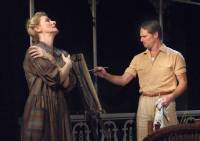
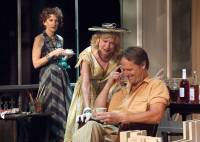

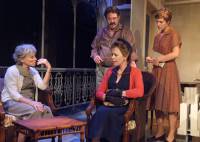
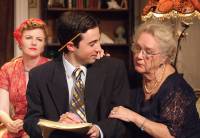
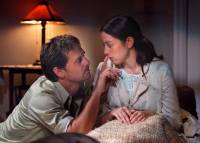
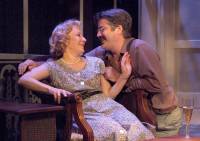
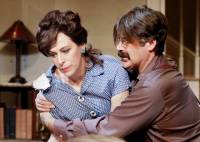

 Since 2007, Steven Stanley's StageSceneLA.com has spotlighted the best in Southern California theater via reviews, interviews, and its annual StageSceneLA Scenies.
Since 2007, Steven Stanley's StageSceneLA.com has spotlighted the best in Southern California theater via reviews, interviews, and its annual StageSceneLA Scenies.







 COPYRIGHT 2024 STEVEN STANLEY :: DESIGN BY
COPYRIGHT 2024 STEVEN STANLEY :: DESIGN BY